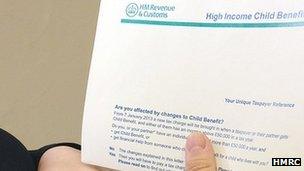Child benefit changes questioned by IFS
- Published

Many thousands of people have received letters explaining that benefit entitlement will change
Child benefit cuts could cause "incoherence in the welfare system" and lead to some facing a 65% marginal income tax rate, a think tank has said.
Families with one parent earning more than £50,000 will no longer be eligible for the full benefit from Monday.
The Institute for Fiscal Studies (IFS) suggested that the policy created "administrative complexities".
It warned that 40,000 families would end up paying out as much as 65p of every extra pound they earned.
This would be their income tax rate, and a tax charge for receiving child benefit for those with three children.
The IFS said these people would be more likely to work less or put more into pension funds to avoid the hit.
But the Treasury questioned the report, arguing that the new system was simpler for the vast majority of families.
Tax effect
Child benefit is currently paid at the rate of £20.30 a week for the first child, and then £13.40 a week for each child after that.
It lasts until each child reaches 16, or 18 if they are still in full-time education, and in some cases until they are 20.
From Monday, eligible households where one individual earns more than £60,000 will lose the benefit altogether, with the money to be recovered through the tax system unless they have opted out of receiving it by the end of Sunday.
Families where one parent earns between £50,000 and £60,000 will see their benefit progressively reduced based on income - causing a significant rise in marginal tax rates for those families, according to the IFS.
It said the marginal tax rate faced by those with an earner between £50,000 and £60,000 would rise by 11 percentage points for those with one child and another seven for each additional child. For 40,000 households with three or more children it would jump as high as 65%.
Added complexity
The think tank said that the policy would reduce public spending by an estimated £1.5bn in 2013-14.
The savings would come because an estimated 820,000 families will lose child benefit entirely, with another 320,000 seeing a cut in entitlement.
Angela Epstein has a family income of £100,000 and feels she is as entitled to child benefit as any other parent
The IFS said it expected the average loss to be £1,300 a year.
It also argued that there would be added complexity as up to 500,000 more people would have to complete self-assessment tax returns. It might also affect the planned new Universal Credit system.
"Perhaps the biggest concern is the incoherence it creates in the welfare system," the IFS report said.
However, the Treasury hit back at the report.
"The IFS proposed abolishing child benefit completely and subsuming it into the tax credit system. We disagreed with this approach," a Treasury spokesman said.
"Under our proposals, 85% of the population will continue to receive child benefit as they do now, 90% will continue to gain from child benefit.
"The top 15% of higher earners will lose some or all of their child benefit, but we are having to take some difficult decisions to reduce welfare spending and it is important that those with the broadest shoulders bear the biggest burden."
But Chris Leslie, Labour's shadow Treasury minister, said: "This latest analysis from the Institute for Fiscal Studies highlights the massive complexity of this unfair policy."